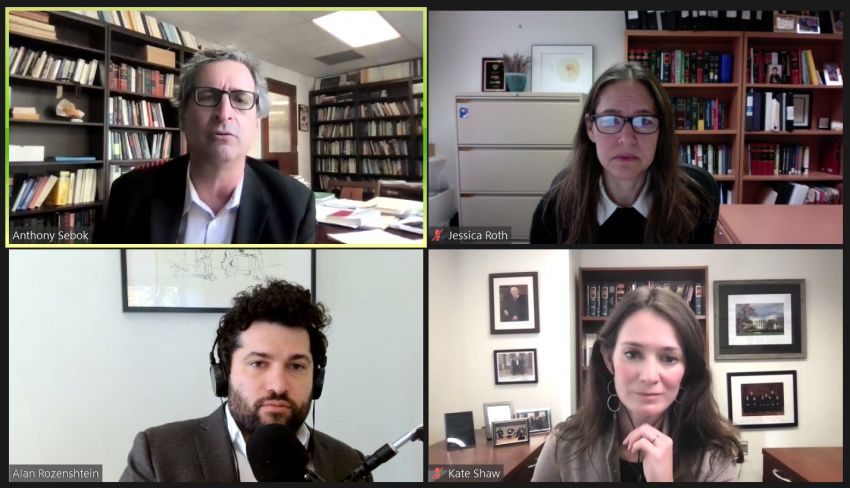
What are the risks and ethical responsibilities for lawyers working in the executive branch when asked to defend actions that raise serious constitutional concerns? On November 4 the Jacob Burns Center for Ethics in the Practice of Law held the first discussion in a new series called “Lawyers Behaving Badly,” hosted by Co-Directors Jessica Roth and Anthony Sebok. The first session, entitled “Episode One: The Executive Branch”, featured Cardozo’s Professor Kate Shaw. Shaw is a constitutional scholar and has served in the White House Counsel’s Office as a Special Assistant to the President and Associate Counsel to the President in the Obama Administration.
Prompting this program were the revelations that John Eastman, a former law school dean, and former Assistant Attorney General Jeffrey Clark advised the Trump White House to argue a theory of law asserting that the results of the 2020 presidential election could be set aside. Panelists discussed the professional responsibilities set forth for executive branch lawyers, how the legal community should respond to violations of duty similar to Eastman and Clark’s actions and whether the ethical guardrails that constrain overzealous executive branch lawyers are sufficient to protect democratic institutions.
Shaw was joined by Alan Rozenshtein, Associate Professor at The University of Minnesota Law School, who served as Attorney Advisor with the Office of Law and Policy in the National Security Division of the U.S. Department of Justice and as a Special Assistant United States Attorney in the U.S. Attorney's Office for the District of Maryland.
Panelists discussed the special risks that arise when lawyers advising the executive branch give erroneous or highly questionable advice on matters of constitutional and federal law. Shaw opened with a summary of executive branch legal obligations and began to question what duties Eastman and Clark owed as a matter of professional responsibility in their roles as legal advisors to former President Trump. Shaw argued that White House lawyers’ obligations are underspecified compared to obligations that attach to service elsewhere in the executive branch. “Eastman was an outside advisor and not formally serving as a White House lawyer,” she remarked. “I don’t think we have a lot of precedent for the kind of counsel role Eastman was serving.” Shaw believed the fact that Trump was unlikely to receive the kind of counsel that he sought from anyone inside the White House Counsel’s Office to overturn the election is what drove him to seek outside advice.
Rozenshtein noted that multiple presidents have sought outside counsel in ways that raised serious questions. “Before the Biden Administration released its most recent version of the eviction moratorium, it appears it got most of its advice from outside counsel,” he said. “This raises some of the same concerns as Trump on the process point. It’s something worth thinking about.”
Rozenshtein also raised the point that executive branch lawyers, whether in the Office of Special Counsel or the Department of Justice, have additional ethical considerations because often the Courts will not review these arguments, as they are internal and subject to national security and other claims. “The buck stops at the Resolute desk,” he said. “There’s always an incentive to say yes to your client and you frequently don’t have the courts as backstops.”
Roth put forward the topic of comparing Eastman and Clark’s actions to other instances of lawyers providing controversial counsel within the executive branch, including the “torture memos” prepared under the Bush Administration by John Yoo and Jay Bybee which is said to have given legal cover to prisoner torture and abuse following the terrorist attacks of September 11. The Department of Justice’s Office of Professional Responsibility (OPR) evaluated the conduct of the two attorneys as part of disciplinary procedures and concluded that Yoo and Bybee violated their duty to exercise independent legal judgment.
“The OPR’s conclusion raises the question of what kind of attitude these attorneys took towards their responsibility to their client,” Sebok stated. “Every client wants their lawyer to push as hard as possible – not past the point of frivolous – but up to that point if it’s going to secure the ends of the client’s interest.”
The panel concluded with a discussion of the right remedies for this kind of lawyering. Roth asked whether there should be discipline from the bar for Eastman and Clark or possibly other kinds of sanctions.
“When a lawyer acts in a way that shows clear disregard for the fundamental principles of lawyering, it is the entire purpose of the bar to make that clear,” said Rozenshtein. “Despite there being a large diversity of views within the profession, the one thing that matters is our fundamental commitment.”
“There need to be serious social, professional and reputational kinds of sanctions if we want to disincentivize this kind of conduct,” echoed Shaw.
This was the first installment of the “Lawyers Behaving Badly” series. Episode Two will cover Arnold & Porter’s controversial handling of discovery on behalf of Endo International in recent opioid litigation.
